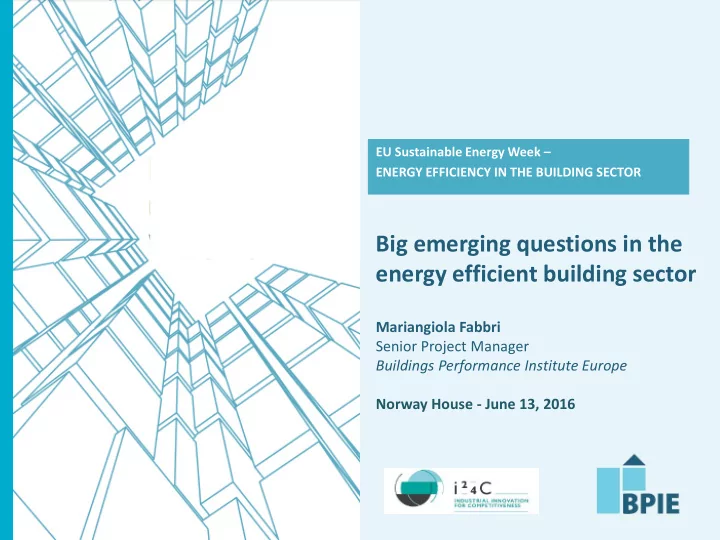

EU Sustainable Energy Week – ENERGY EFFICIENCY IN THE BUILDING SECTOR Big emerging questions in the energy efficient building sector Mariangiola Fabbri Senior Project Manager Buildings Performance Institute Europe Norway House - June 13, 2016
The Buildings Performance Institute Europe ⌂ Committed to increasing the energy performance of buildings across Europe www.bpie.eu @BPIE_eu
The context • Construction sector is characterised by a low level of innovation (product and process) • EU EPBD requirements re nZEB have stimulated transformation in the new construction market • Existing building stock big elephant in the room: no one-fits all- solution to tackle this beast • Fast changes in the energy market (RES, smart grids, storage capacity, smart devices, big data, DSM and DR), new trends, players and service models Is the building sector keeping up?
Question #1 NZEB as a paradigm shift – is it true for all? Building nZEBs is no longer rocket- science, but… ⌂ Low-energy buildings are complex systems and need holistic approaches • Need for new service-oriented business models, integrating design, skills and financing DO CONSTRUCTION PROFESSIONALS HAVE THE NECESSARY SKILLS? ⌂ nZEBs are not required for existing buildings
Question #2 How to improve the existing building stock? 75-90% of the current building stock will be in use in 2050 Great heterogeneity of EU building stock CZ DE FR SW UK NL ES GR RO IT LIT PT BUL AU BE @BPIE_eu
Main Challenges Buildings are expected to satisfy different needs (comfort, performance and affordability) In practice: 1. Achieve higher and deeper renovation rates (and avoid lock-in effects) 2. Deploy mass market potential by applying industrialised processes and new service oriented models 3. Address fuel poverty 4. Consider multiple benefits of better performance
How to achieve deeper renovation rates and avoid lock-in effect? RENOVATION HOLISTIC DEEP RENOVATION STAGED DEEP RENOVATION
How to deploy mass market potential ? Energiesprong: organising mass demand Energy performance guarantee One-week delivery Affordability Attractiveness
How to address fuel poverty? Need for affordable renovations and modular new residential buildings EU between 50 and 125 million (20%) people are in fuel poverty. Energy subsidies and direct financial support for household heating don’t provide long-term solution to fuel-poverty (BPIE 2014) No common definition Vigorous energy-renovation measures offer a long-term answer
Multiple benefits of better building performance
Question #3 How to pay for renovation ? Source: BPIE
Question #4 How to deal with a changing energy market? Buildings as micro-energy hubs RENEWABLE ENERGY PRODUCTION BUILDINGS ENERGY DEMAND RESPONSE STORAGE @BPIE_eu
The value of H2020 H2020 calls (Sept 2016) cover most of these issues: • NZEB and Cost-reduction (call EE-13) • Upskilling workforce ( call EE-14) • Deeper and higher renovation and market barriers (EE-11) • Fuel poverty (EE-06) • Financing (EE-23-24-25)
One final question Do we have the appropriate policy framework? ECO- H&C DESIGN strategy EED RED Energy Union EPBD New Energy Market @BPIE_eu
Thank you for your attention Mariangiola Fabbri mariangiola.fabbri@bpie.eu
Recommend
More recommend